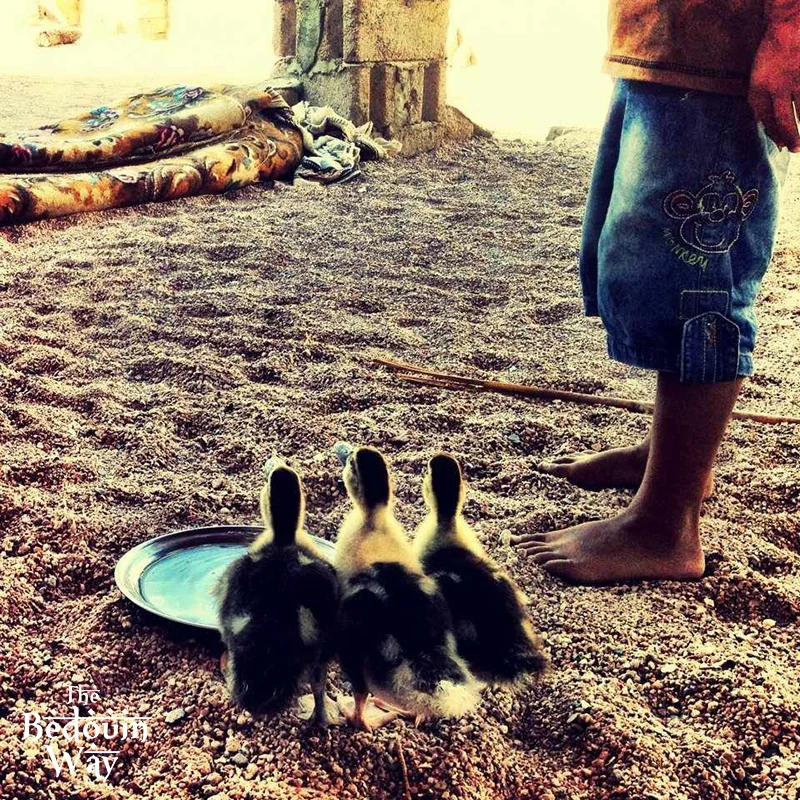Following on from our "Who is the Bedouin Woman" article, the story below has been written using notes taken from interviews with several different Bedouin females in South Sinai, ranging from 14 to 50 years of age. We hope it gives you an insight into their lives.
It has been put together by Allie Astell, who has lived in Dahab for the past few years.
The Girl
"My childhood was like a dream. I played outdoors every day with my friends. We would ride our donkeys to the mountains. Our goats and sheep followed behind. We talked, we laughed and we played while our animals ate good herbs to make them strong and healthy.
We sometimes slept high up where the air was fresh and we would wake to sunrise to make tea. Life was easy. My mother and father didn’t worry. I was brought up by everyone around our home so they always knew where I was.
My sisters and I would help my mother with the housework. Between us all the jobs were done within the home by lunchtime. We would pray at the start of the day, light the fire, brew our tea, cook breakfast, make fresh bread, clean the house, beat the blankets, wash our clothes, hang them in the sunshine. We watered the plants and herbs, and then fed our animals.
In our free time we would visit friends, or they would come to us. I remember the laughter clearly – so many jokes, so many stories. The Bedouin have many tales to tell and we love to share them.
My grandmother and great grandmother would sit with us and tell us about their life. We are proud of our culture and want all our stories to be carried down through the generations."
The Explorer
"The family would often go away on holiday to the mountains, the desert, the beach. These were the best times of my life and they still are with my own children and grandchildren.
We sometimes stayed a few days, or even for a month picking fresh herbs and plants to use for tea, medicine or food, hunting for our dinner, caring for our animals, making cheese from the goat milk, drying the fish we had caught that day, pounding an octopus against a rock to make it tender then stewing it with rice and vegetables.
I would return with brown skin and sun streaks in my hair.
The best place to be was the mountains after the rain. It makes the Bedouin so happy to see greenery, new life, blossoming flowers and plentiful food for our livestock to eat.
The milk, cheese and meat that comes from animals that have been free and fed well can not compare to any other food in the world. Living in the desert, the rain comes as a blessing from Allah and we rejoice."
The Dreamer
"In my teenage years I began to wear a headscarf to cover my hair, and I would also put on a galabya (a traditional long dress). My parents told me that if I saw a man when I was in the street I should look away, and if he was a good person he would do the same. Bedouin men and women are respectful to each other. I never ventured far from home once I was 14 (except for our family trips). But sometimes on my way to a friend’s house I would admire the way a young man moved, or I would catch a glimpse of his eyes.
Before, in previous generations, the parents arranged many Bedouin marriages. Sometimes the woman didn’t see her new husband until the wedding day. But now things are different and most of us marry for love, or perhaps even simply for knowing that the man we see before us is a good one with a golden heart.
And if we choose the wrong man? In our culture the women are able to divorce our husbands if we are unhappy with them with no recrimination. We simply go to our parents’ home and talk to them first, and the divorce can happen in one day with a legal paper. Three months and 10 days later we can re-marry if we choose to do so. But some of my friends have since gone on to study medicine and law to build a career and support their children without the need of another man."
The Fiancée
"What was I looking for in my husband? Kindness and warmth, Love, protection and security. He would be a good father. He would give me the freedom to visit my family and friends. He would take me away on trips to relax in our favourite locations. And perhaps occasionally the money he gave me would be to buy myself a gift and not just food to put on the table.
He didn’t have to be rich, but I hoped he would be able to look after the family financially. I would be happy if we built our future together, step-by-step and brick by brick. These days the young Bedouin women look for more than this and ask for jewellery, clothes and a beautiful home.
One day when I was 20 a Bedouin passed whom I had noticed before. I barely knew his face as I had always quickly looked away when I saw him but there was something about him that I liked. This time he threw a plastic bag at my feet as I walked by. Bending over to pick it up I looked inside to see it was full of chocolate and he had written me a note to tell me he liked me. This was the way men would sometimes communicate with us in the past. Now, though, we meet men much more easily and can talk to them regularly at our family homes or on the telephone until we know for sure if we would like to marry them.
It wasn’t long before I became engaged to a friend of the family. I liked him, he liked me, and we had both heard good things about each other. It was important to both of us that we married someone that others admired and respected."
The Wife
"It is always my aim to make sure that my husband never marries another woman. In our culture and in the Islamic faith, men are allowed to have four wives.
When a man does marry again, he has to share his time equally between his wives and children. This is his duty.
To keep my husband for myself, I always make sure that I am the best cook in our street, that I have the cleanest house, that our children wear good clothes. I keep our garden and animals well tended, and I never let him down in our private time when we are alone. Simple things.
Sometimes he goes away on a safari for two weeks, so during this time I use my mind when I have issues in the house. I want him to know that he has an intelligent wife who is capable of problem solving without him being there. I am good at fixing many things these days.
Our marriage works. I chose my husband well. I am truly happy."
The Mother
"And so the circle of life begins again. I am now 50 and I have 6 children who are aged between 8 and 30.
They spend their days in the same way as I spent mine when I was younger, although maybe modern life has brought some changes.
The older children help me to bring up the younger ones and my 4 daughters mean everything to me as we sit and talk about their hopes and dreams. They remind me so much of myself at their age.
Our family is lively. We all talk a lot, laugh most of the time, and if one of us is feeling sad the others know what to do to make them happy again. The women all work together to make sure the house is clean and that our guests can always expect tea and coffee around the fire with nice seating."
The Queen
"Sometimes tourists and foreign friends come to our house for tea and I was once asked if looking back on my time, I would swap my life with another women from overseas.
Someone who was “free” in the Western sense – uncovered, able to travel long distances alone, able to work anywhere they liked to and date any man they chose.
I have a husband who I love and I would give my life for my beautiful children. I see my friends every day. I still often laugh until I cry. I regularly take trips away with my family. I don’t have to worry about money as long as there is food. If we are ever short, there is always help at hand from our neighbours who bring us meals and bread. And we do the same for them.
To me, the meaning of freedom is to have choice, be happy and enjoy my life as I please surrounded by the people I love.
So I replied, "I would never trade my life for another one. Thanks be to God for everything he has given me. I am truly blessed. Alhamdulillah."
Copyright © 2014, The Bedouin Way. All rights reserved.








